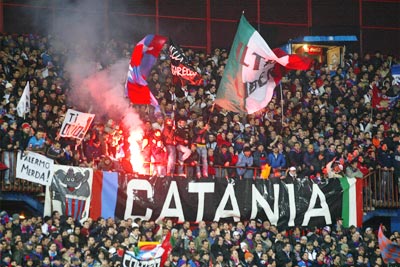 The death of policeman Filippo Reciti in crowd trouble following a Serie A match on Friday has left Italians wondering whether football authorities can ever get violence in stadiums under control.
The death of policeman Filippo Reciti in crowd trouble following a Serie A match on Friday has left Italians wondering whether football authorities can ever get violence in stadiums under control.
The game between Catania and Palermo began with a minute's silence in memory of Ermanno Licursi, the club official who died last Saturday after being attacked while trying to break up a fight at an amateur league match in the southern town of Luzzi.
The nationwide soul-searching that followed that incident, however, seemed to have made no difference at all when Palermo took the lead and Catania fans started to hurl flares.
Tear gas and a half-hour suspension failed to stop the trouble, which spilled out on to the streets, claiming the life of Reciti, who died when a home-made bomb exploded in his face.
For those who follow Italian football closely, the incident was appalling but not surprising.
Violence is endemic in and around the country's football stadiums, from professional down to amateur level, with fans fighting each other or the police, and flares, firecrackers and other explosives as much part of a Serie A match as banners, chants and cheering.
The problem dates back a long time. In 1979 Lazio supporter Vincenzo Paparelli was killed after being hit by a flare fired by an opposition fan in the city derby against AS Roma.
In January 1995 Genoa fan Vincenzo Spagnolo died after being stabbed before a game against AC Milan.
More recently, Milan fans smuggled a scooter into the San Siro stadium, which they hurled off the third tier. Incredibly, no one was injured.
In September 2004 Roma's Champions League match against Dynamo Kiev was suspended after Swedish referee Anders Frisk was hit by an object thrown from the stands.
Later the same season, Milan's Champions League semi-final against Inter was abandoned after Inter fans showered flares down on Milan keeper Dida.
These incidents are just the tip of the iceberg, however. Less serious ones take place every weekend, but are not reported outside Italy because they are so frequent and do not result in death or life-threatening
Last Sunday, for example, the day after Licursi died, Fiorentina fans stabbed a Livorno supporter before a game in Florence; Atalanta fans battled with police guarding coaches carrying visiting Catania supporters; and a match in the fourth division Serie D was suspended after a linesman was hit by a drum thrown from the crowd.
TURNING POINT
Reciti's death could be a turning point in Italy. Like their English counterparts in the years leading up to the 1985 Heysel Stadium disaster in Brussels, the country's football authorities have been warned many times to get their house in order.
Obstacles to progress remain, however.
In Italy the vast majority of stadiums are owned by city councils, who rent them out to football clubs.
As a result, clubs are unwilling to invest large sums of money improving security.
Italian clubs are also not directly responsible for maintaining order inside the stadiums.
Stewards guide spectators to their seats, but usually stand by and watch as fans scale barriers and throw flares at opposition supporters.
Meanwhile, the police, who are paid a small overtime rate to work at matches, concentrate on keeping rival fans apart rather than nipping violent behaviour in the bud.
Then there is the power wielded by Italy's hard-core "ultra" fans, which has turned the most volatile areas of stadiums into no-go zones for the police.
In the face of these problems, the decision of Italian Football Federation chief Luca Pancalli to suspend all matches indefinitely inspired hope -- signalling that the country's governing body was ready to take a hard line to sort out the problem.
After Licursi died, Pancalli warned that further violence would result in play being halted.
On Friday he kept his word. Now it is up to the club presidents to take action to ensure it does not happen again.
Photograph: Getty Images | Text: Reuters







 © 2025
© 2025